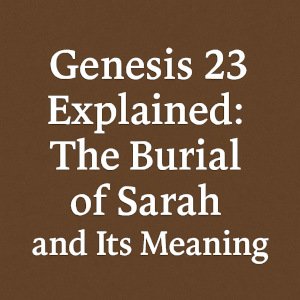Genesis 23 Explained: The Burial of Sarah and Its Meaning.
In the rich and layered narrative of the Bible, Genesis 23 stands out as a quiet yet powerful chapter. At first glance, it may seem like a simple account of the death and burial of Sarah, the wife of Abraham. But a closer look reveals that this chapter holds deep spiritual significance—touching on themes of faith, legacy, and the fulfillment of God’s promises.
Table of Contents
The Death of Sarah: More Than Grief
Genesis 23 begins with the death of Sarah at the age of 127. She is the only woman in the Bible whose age at death is recorded, which highlights her importance in the biblical story. Her passing marks the end of a significant era, but more importantly, it sets the stage for Abraham to take a major step in faith.
Abraham mourns deeply, but he does not remain passive in his grief. Instead, he acts. He seeks to purchase a burial site for Sarah—not just any grave, but one that would become the first piece of the promised land he would ever legally own. This decision is not just practical; it is prophetic.
A Bold Act of Faith
Abraham’s negotiation with the Hittites in Genesis 23 is one of the longest recorded dialogues in the Old Testament. He insists on paying full price for the Cave of Machpelah near Mamre. The act of purchasing land is deeply symbolic. Though God had promised him the land of Canaan, Abraham did not yet possess it. By buying the land, Abraham planted a flag of faith, believing that God’s covenant would be fulfilled—even if it was beyond his lifetime.
This makes Genesis 23 a pivotal moment in the story of Israel. It is the first tangible step toward the fulfillment of God’s promise. It teaches us that faith is not only spiritual—it’s practical. Sometimes, acting in faith means signing papers, making plans, and investing in a future you can’t fully see.
Honoring the Legacy of Sarah
Sarah’s burial is not just a closing moment—it’s a celebration of a legacy. She was a matriarch of the faith, a woman who journeyed with Abraham through unknown lands, barrenness, and divine promises. In Genesis 23, Abraham honors her not only with mourning but with action. He chooses a burial place that reflects permanence and hope, one that says: “We are here to stay. God’s promise lives on.”
Later in the Bible, we learn that other patriarchs—Abraham himself, Isaac, Rebekah, Jacob, and Leah—are buried in the same cave. This solidifies the Cave of Machpelah as a symbol of continuity, faith, and covenant. It all began with Sarah’s burial.
The Spiritual Meaning of Genesis 23
Genesis 23 is about more than land or legal negotiations. It teaches us that faith looks forward. Abraham didn’t buy the land because he had full control of the future, but because he trusted the One who did. His actions remind us to take steps of faith, even when we don’t see the whole picture.
In our lives, we are often faced with moments where faith must be lived out in practical ways. Whether it’s making a hard decision, honoring a loved one, or investing in something bigger than ourselves, we are called to trust—just like Abraham did.
Final Reflections
Genesis 23 may not be filled with miracles or dramatic events, but it holds a quiet, profound message. Through Abraham’s response to Sarah’s death, we learn about hope, trust, and the long view of God’s promises. It invites us to reflect: Where are we planting our faith today? Are we investing in the temporary or in the eternal?
This chapter reminds us that even in times of loss, we can act with purpose. And in doing so, we honor not just the people we love, but the God we serve.

For more biblical insights and verse-by-verse reflection, follow us at Holy Thread Project and subscribe to our YouTube channel.
P.S. Even in the quiet chapters of Scripture, God is speaking. Genesis 23 reminds us that every detail has purpose—especially when guided by faith.
#Genesis23 #BurialOfSarah #FaithInAction #BiblicalWisdom #HolyThreadProject